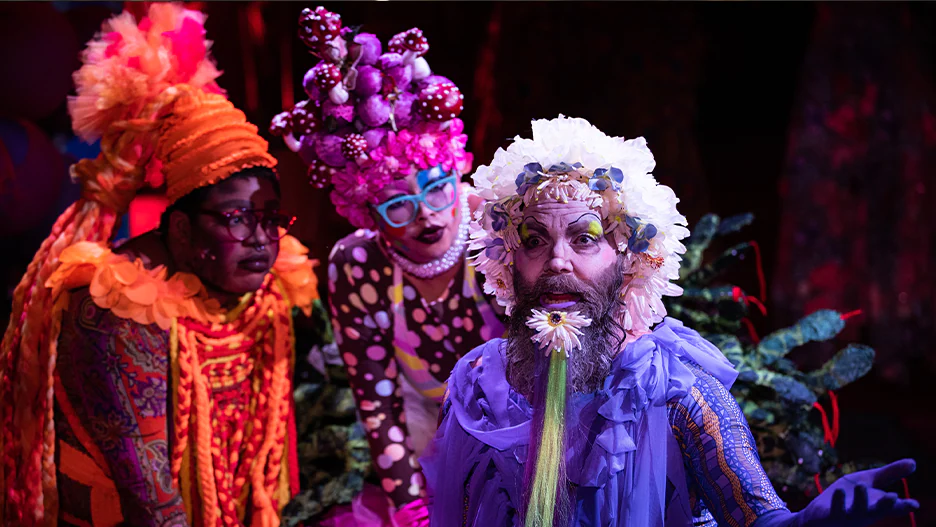In a recent episode of HBO’s “Curb Your Enthusiasm,” the very much alive Albert Brooks throws himself a funeral. Everyone is appropriately laudatory, and Brooks enjoys himself watching it all on closed-circuit TV up in his bedroom. And then someone accidentally opens the wrong closet door and discovers that Brooks is a COVID-19 hoarder.
Taylor Mac does Brooks one better, and not only throws himself a funeral. He takes center stage and casts himself as Socrates in “The Hang,” which opened Sunday at Off Broadway’s Here Arts Center. Aristophanes (Ryan Chittaphong), who attacked the sage in his comedy “The Clouds,” is the bad guy here. Plato (Chittaphong again), no fan of comedy or tragedy, records it all on an ancient stenograph, writing “Apology.” And everyone else has been invited to “hang” as the hemlock is broken out. Guests run the gamut, from disciples like Cebes to junk candy like Skittles and that well-known fashion accessory Paillette. Among those merry revelers, Kat Edmonson emerges as the Teresa Stratas of Off-Off Broadway.
This blissfully bizarre new opera, with book and lyrics by Mac and music by Matt Ray, dazzles immediately — with the cast of nine getting to wear fabulous outfits by Machine Dazzle. The designer also uses what tulle, sequins and crepe was left over to dress up the gaudy womb-like set.

The jazz score, with detours into blues and gospel, is always arresting and often beguiling in its textured beauty, not to mention its variety. Mac and Ray add a little Gilbert and Sullivan here, some lounge there and even a dash of Noel Coward. No, they don’t imitate the songs of Coward. They bring him on stage to explain Socrates’ “crimes” involving the male youth of Athens. Spoiler: Mac gets to play Coward, too.
Giving his shows a strong narrative drive has never been a Mac signature. Instead, he loads up “The Hang” with more ideas than you’ll hear in a season of opera at the Met. What is the nature of art? Is style more important than content? Does beauty have anything to do with morality? How are justice and virtue being manipulated to end curiosity? Frankly, this last question stumped me. But I was right at home with the next one: Why would a bunch of butch gays dress in black t-shirts and black jeans to protest the corporate takeover of the Gay Pride March? A radical fairy, Socrates makes it clear he has lived his life on the float with all the dancing half-naked boys singing “It’s Raining Men (Hallelujah).”
Niegel Smith’s direction lends a sweet let’s-put-on-a-show ambiance to all the philosophical bickering. In the beginning of the debate, Mac gives Socrates a wide-eyed “Who me?” naivete. It soon becomes apparent that he also gives himself the most extravagant costumes – and in this production, that’s saying a lot. Unfortunately, one long costume change, into a white frock, isn’t worth the wait and completely punctures the denouement. “The Hang” delivers a half dozen endings after the hemlock should have done its work. The very good news: Repeatedly, just when another song is not needed, Mac’s lyrics and Ray’s music prove more seductive than ever. Only Socrates’ final whiny lament disappoints.
Criticizing Mac for being indulgent is a little like bitching that the Empire State Building is tall. Socrates’ very long demise here recalls a New Orleans jazz funeral complete with a marching brass band. You have to go back to Barbra Streisand singing “It’s Gonna Be a Great Day” in “Funny Lady” to find an example of such awesome, breathtaking cultural appropriation.
Robert Hofler, ‘s lead theater critic, has worked as an editor at Life, Us Weekly and Variety. His books include “The Man Who Invented Rock Hudson,” “Party Animals,” and “Sexplosion: From Andy Warhol to A Clockwork Orange, How a Generation of Pop Rebels Broke All the Taboos.” His latest book, “Money, Murder, and Dominick Dunne,” is now in paperback.


